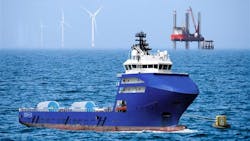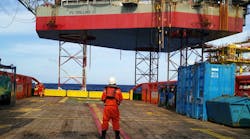Increasing OSV procurement signals a new era of innovation
Key Highlights
- Offshore support vessel procurement is surging globally, with Brazil leading regional modernization efforts.
- New vessel designs incorporate advanced technologies, such as hybrid electric propulsion, dual-fuel engines and alternative fuels, to reduce emissions and improve efficiency.
- Regulatory frameworks are accelerating the adoption of cleaner fuels and digital solutions for enhanced operational performance.
- Brazil's emphasis on local content requirements fosters domestic shipbuilding, creating jobs and stimulating economic growth while balancing international technological innovation.
Dr. Wei Huang and Gabrielle Caldas, ABS
Offshore support vessel (OSV) procurement is surging to support strategic plans to revitalize traditional offshore oil and gas activity and explore promising frontiers.
Brazil state-owned Petrobras' renewal of its platform supply vessels (PSVs) signals a booming market ahead as the operator aims to deliver a greener fleet by 2030.
As digitalization and environmental considerations transform the OSV sector in South America and globally, new vessel designs and future fleets will be equipped with the latest technological advancements to enhance efficient performance in complex operations. Three key pillars are shaping the future of the global OSV market: compliance, operational efficiency and safety performance.
Classification societies remain an integral part of validating the safe adoption of new technologies, serving as a trusted adviser to the OSV market. The collaboration between class and industry is charting the course in key regions across the Americas, with Brazil's procurement for a modern OSV fleet leading the way.
A raft of evolving OSV requirements
OSV requirements are being redefined to keep pace with regulations and rapid technological innovation. The push for reduced emissions is accelerating the adoption of novel technologies and propulsion systems to reduce fuel consumption.
Expanded emissions reporting requirements for European Union (EU) ports now mandate that offshore vessels of 400 gross tons and above report emissions data under the EU Monitoring, Reporting and Verification regulation. The implementation of FuelEU Maritime in 2025, promoting renewable, low-carbon fuels and clean energy technologies, will significantly influence fuel choices for OSVs operating in European waters.
Globally, offshore operators are seeking hybrid battery, dual-fuel and alternative fuel technologies aimed at performance efficiency and emissions reduction to demonstrate their commitment to meeting climate-related objectives. This evolution is spurring demand for technologies that support carbon neutral, fully digitalized, highly automated and smartly monitored vessels.
Fleet modernization and engineering for the future
According to ABS's Insights into Future OSV Designs and Operations, the OSV of the future will be multi-functional, designed to perform complex support operations. Modern OSVs will be equipped to serve multiple offshore sectors, such as carbon capture transport and renewables, with larger accommodation spaces, heavy-lift cranes, helidecks and streamlined hull forms.
In Brazil, utilizing domestic shipyards provides a significant boost to the Brazilian shipbuilding industry, creating jobs and stimulating economic growth. This approach aligns with Brazil's local content requirements, which mandate that 40% to 70% of vessel components, materials and labor must be sourced domestically, depending on vessel type and component category.
Brazil's procurement of a modern OSV fleet includes onboarding smart technologies, electrification and alternative fuel solutions, such as hybrid electric propulsion systems and engines capable of using ethanol and methanol. This fleet transformation must balance international technological innovation with local manufacturing capabilities.
New orders represent a long-term investment in the region's offshore infrastructure to support a ramp up in offshore operations into the next decade as energy demand rises.
Onboarding new technologies
Next-generation OSVs will deliver significant benefits through improved operational efficiency and reduced fuel consumption. Early adopters in Brazil's OSV sector are reporting fuel consumption reductions with corresponding emissions reductions when implementing hybrid systems combined with dual-fuel capabilities.
However, implementation poses new challenges. Retrofitting existing vessels with dual-fuel capabilities requires significant capital investment and may result in operational downtime. For newbuilds, higher initial costs must be balanced against long-term operational savings and regulatory compliance benefits.
Dual-fuel engine technology: The transition to dual-fuel engine technology offers greater fuel flexibility for OSVs. Modern dual-fuel engines effectively switch between fuel types without interrupting operations, offering both operational flexibility and emissions reduction capabilities.
Petrobras' recent tender specifications highlight its commitment to this technology, with requirements for vessels equipped with hybrid diesel-electric propulsion systems capable of utilizing multiple fuel types.
Alternative fuel options: Several alternative fuel options are emerging as viable solutions for the global OSV fleet, with particular focus on ethanol and methanol. Methanol is rapidly emerging as a viable alternative due to its lower carbon footprint and simpler onboard handling compared to LNG. The existing infrastructure for methanol bunkering provides a significant advantage for OSV adoption. However, its lower energy density compared to conventional fuels and high flammability require careful management and additional safety measures.
Digital solutions: Modern OSVs are increasingly equipped with smart technologies that optimize fleet performance, including advanced dynamic positioning systems, remote monitoring capabilities and predictive maintenance implementation. Cybersecurity considerations are becoming more prominent as vessels become more connected. Real-time fuel consumption monitoring and emissions tracking systems are becoming standard features, allowing operators to optimize vessel operations for both economic and environmental performance.
Safety considerations for newbuilds
Adopting alternative fuels requires understanding associated risks for vessel safety and personnel safety in OSV operations.
Methanol presents unique safety challenges due to its toxicity and flammability. Vapor detection systems, specialized ventilation and appropriate personal protective equipment are essential for safe handling. These safety considerations must be addressed through comprehensive risk assessments during design and ongoing training throughout vessel operation.
Classification rules and standards for OSVs reflect the latest advancements and safety best practices, with particular focus on decarbonization, digitalization, cybersecurity and other sustainability factors. Electrification and alternative fuel guidelines cover requirements for offshore energy generation, battery energy storage systems, fuel cells and hybrid electrical power systems.
To support Brazil's local content requirements, classification societies provide specialized knowledge of regional needs, offering an objective view as key project collaborators during planning, design, construction and delivery phases.
As the global OSV fleet undergoes significant transformation to support renewed offshore activity in key regions like South America, ABS is working closely with the industry to develop engineering guidance to enhance offshore safety in this next era of innovation.
About the Author

Dr. Wei Huang
Dr. Wei Huang is ABS Director, Global Offshore, Support Vessel Sector Lead for North America.
In 1998, Dr. Huang joined ABS in the engineering department providing engineering plan review and approval. She has participated in research and Rule development for marine and offshore structures with the ABS Europe Division in London, ABS Americas Division, ABS Corporate Technology and ABS Global Offshore in Houston. As the offshore support vessel market lead, Dr. Huang provides strategic insight and direction on changing market conditions that drive client initiatives and programs within the global OSV sector.
She received a doctorate degree in civil engineering from the University of Portsmouth, UK, and also holds an MS degree in ocean engineering and a BS degree in naval architecture from Shanghai Jiao Tong University in China. Dr. Huang is a Professional Engineer licensed by Texas Board of Professional Engineers and a Chartered Engineer registered with UK Engineering Council.

Gabrielle Caldas
Gabrielle Caldas is responsible for ABS' strategic offshore accounts in Central and South America.
Caldas graduated in international relations from Pontifical Catholic University of Rio de Janeiro and counts 13 years of experience in the energy industry. She has a postgraduate degree in oil and gas from the Federal University of Rio de Janeiro and also specialized in maritime law at the Getúlio Vargas Foundation.
Caldas previously worked in the commercial and business development divisions within the maritime industry, including Clarksons, DOF and OceanPact.

